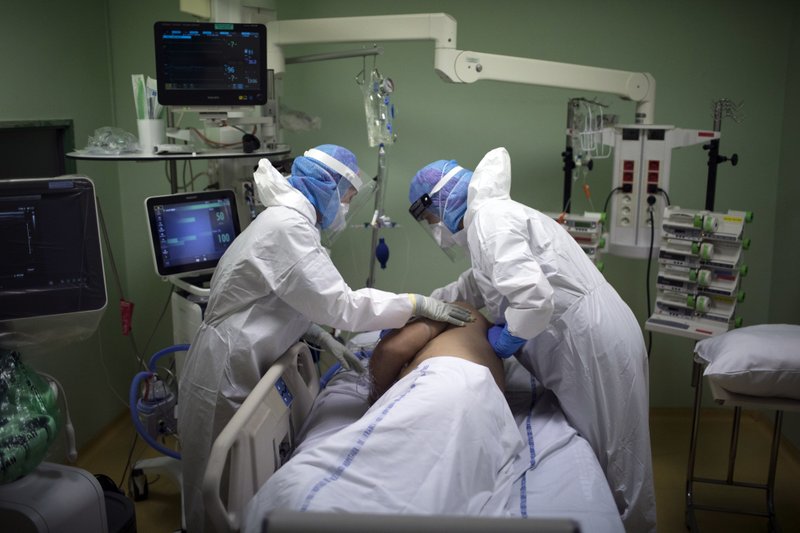Germany on Wednesday moved to shut down restaurants, bars and theaters all over again and France weighed demands for another nationwide lockdown as a new wave of coronavirus infections in Europe and the U.S. wipes out months of progress against the scourge on two continents.
The resurgence and the growing clampdown sent a shudder through financial markets, and stocks slumped.
“We must act, and now, to avoid an acute national health emergency,” German Chancellor Angela Merkel said as she announced a four-week partial lockdown starting Monday.
French President Emmanuel Macron planned an address Wednesday night as many French doctors urged a nationwide lockdown, with 58% of the country’s intensive care units now occupied by COVID-19 patients.
Countries such as Switzerland, Italy, Bulgaria and Greece have closed or otherwise clamped down again on bars and restaurants and imposed other restrictions such as curfews and mandatory mask-wearing. Both Italy and Germany set records for new infections Wednesday, with Italy reporting nearly 25,000 in a single day and Germany logging almost 15,000.
“We are deep in the second wave,” European Commission President Ursula von der Leyen said. “I think that this year’s Christmas will be a different Christmas.”
In the U.S., where practically every state is seeing a rise in cases, Illinois Gov. J.B. Pritzker banned indoor dining and drinking in Chicago and limited the number of people gathering in one place.
“We can’t ignore what is happening around us, because without action, this could look worse than anything we saw in the spring,” he said.
The long-feared surge is blamed in part on growing disregard for social distancing and mask-wearing, as well as the onset of cold weather, which is forcing people indoors, where the virus can spread more easily.
After a devastatingly lethal spring, Europe seemed to have beaten back the virus over the summer. Its success was seen as a reproach to the United States and an example of what the U.S. could accomplish if Americans would just stop their political infighting and listen to the scientists.
The S&P 500, the Dow Jones Industrial Average and the Nasdaq were all down in afternoon trading on Wall Street amid worries that fresh lockdowns and rollbacks of business will further drag down economies.
The virus is blamed for more than 250,000 deaths in Europe and about 227,000 in the U.S., according to the count kept by Johns Hopkins University.
More than 2 million new confirmed coronavirus cases have been reported globally in the past week, the World Health Organization said. That is the shortest time ever for such an increase. Forty-six percent of the new cases were reported in Europe.
Von der Leyen said Europe is being confronted with “two enemies.”
“We’re dealing with the coronavirus — the virus itself — and also corona fatigue,” she said. “That is, people are becoming more and more fed up with the preventive measures.”
In the U.S., more than 71,000 people a day are testing positive on average, up from 51,000 two weeks ago. Cases are on the rise in all but two states, Hawaii and Delaware, and deaths are climbing in 39 states, with an average of 805 people dying in the U.S. per day, up from 714 two weeks ago.
Deaths are also on the rise in Europe, with about a 35% spike from the previous week, the WHO said. France reported 523 virus-related deaths in 24 hours Tuesday, the highest daily count since April.
Belgium, the Netherlands, most of Spain and the Czech Republic are seeing similarly high rates of infection.
In Italy, where the Lombardy and Campania regionals are hardest hit, officials have accused right-wing extremists, soccer hooligans and anarchists of using widespread malcontent over new anti-virus restrictions on restaurants, gyms, pools and theaters as a pretext to wage “urban guerrilla” violence during recent protests.
Talks of new lockdowns has also prompted unrest in Germany, where thousands staged a protest at Berlin’s Brandenburg Gate to demand more financial support from the government.
Economists said further restrictions need to be carefully calibrated to avoid dealing a second severe blow to businesses.
“A national lockdown, as we have seen in, ravages an economy and would add significant complications to the ongoing economic recovery,” said Fiona Cincotta, an analyst at online trading firm GAIN Capital.
But Thomas Gitzel, chief economist at Liechtenstein’s VP Bank Group, said a short, strict lockdown could be effective and less harmful than a prolonged slump in consumer spending from persistently high infection levels.
“The strict containment measures in March and April laid the ground for an economically successful summer,” he said.
Even Sweden, which avoided a national lockdown and generally imposed far lighter measures than other European countries, is now urging people to avoid stores and public transportation.
(AP)











